Classical Music CDs Round-up 5 | reviews, news & interviews
Classical Music CDs Round-up 5
Classical Music CDs Round-up 5
This month's releases include Rachmaninov, Brahms, Joanna MacGregor and the soprano sax
Saturday, 20 February 2010
This month's classical music releases include mighty new recordings of Bach, Brahms, Rachmaninov and Prokofiev by major orchestras. Other recordings shine new light on Nielsen and Dallapiccola and make a case for the genius of Bernard Herrmann. From the quirkier end of the spectrum there is choral music from the Baltic, Stravinsky's compositions for piano and violin, a trio of new and older recordings from Joanna MacGregor and Amy Dickson's playing Taverner and Glass on soprano saxophone. As ever, click on the links to buy these recordings on Amazon.
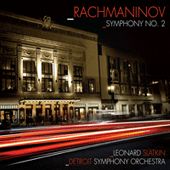 Rachmaninov: Symphony No 2, Vocalise, Detroit Symphony Orchestra/Slatkin (Naxos)
Rachmaninov: Symphony No 2, Vocalise, Detroit Symphony Orchestra/Slatkin (Naxos)In a performance as excellent as this, Rachmaninov’s Second Symphony of 1902 is as good a piece of late-romantic orchestral music as you will ever hear - and I mean the equal of anything by Brahms, Bruckner, Elgar, Strauss or Mahler. Composed in 1908 in the aftermath of a serious creative impasse, the 60-minute work journeys from sombre brooding to joyous triumph, the opening motto theme recurring in various guises during the four movements before returning exultantly at the close of the Finale. Leonard Slatkin’s new Naxos recording, drawn from live performances in Detroit, is sensational - urgent, never indulgent and thrillingly played. I have never heard the first movement climax roar with such pain, and the long, lyrical string lines are beautifully shaped. The Adagio is rapt but never cheesy, leading to a last movement both propulsive and uplifting. Do have the Kleenex ready during the final reprise of the second subject. I can’t remember having enjoyed an orchestral recording so much in ages. I should also point out that the Detroit Symphony’s principal percussionist is aptly called Ian Ding. A top library choice, coupled with a sweetly flowing Vocalise. Find on Amazon
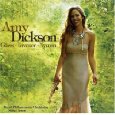 Amy Dickson: Glass, Taverner, Nyman, Royal Philharmonic Orchestra/Toms (Sony)
Amy Dickson: Glass, Taverner, Nyman, Royal Philharmonic Orchestra/Toms (Sony)A high-profile release for this young Australian saxophonist, and a far more serious and rewarding disc than the crossover-style packaging and cover photograph might suggest. Here are three contemporary pieces for soprano saxophone. Or not quite - two of them were originally for solo strings, but Amy Dickson’s virtuosity makes them work exceptionally well. Philip Glass’s 1987 Violin Concerto didn’t make much of an impression when I first heard it several years ago, but the more vocal tones of the saxophone really suit the work. Listen to those sinuous long lines in the middle movement, while the frantic oscillating figures in the faster sections are echt Glass. Dickson has also arranged the first movement of John Taverner’s The Protecting Veil, a work which had a sensational premiere by cellist Stephen Isserlis at the 1989 Proms. Again, the playing is incredibly assured - Taverner’s very slow, very high solo line sounding completely at home in its new colours. Superficially this not "difficult" music, but it takes real skill to compose something which sounds as artless as this. After 16 minutes of Tavernerian meditation, the CD closes with Michael Nyman’s one-movement saxophone concerto Where the Bee Dances. Containing less of the composer’s trademark chugging than usual, it is concise and lyrical. In a solo role that barely gives the soloist time to breathe, Dickson sounds effortless. A natural-sounding recording, and sympathetic, light-footed accompaniment by the RPO and Mikel Toms. Find on Amazon
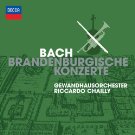 Bach: Brandenburg Concertos, Gewandhausorchester Leipzig/Chailly (Decca)
Bach: Brandenburg Concertos, Gewandhausorchester Leipzig/Chailly (Decca)In which an illustrious European ensemble from a city associated with Bach give live performances of his most famous orchestral works… on modern instruments. I was really curious to hear this set - performances by symphony orchestras of this repertoire just don’t tend to occur now. I also had bad memories of Herbert von Karajan’s recordings with the Berlin Philharmonic, where Bach’s contrapuntal textures were submerged in a mass of over-ripe string tone. Riccardo Chailly is too smart and serious-minded a conductor to fall into this trap, and his performances are first-rate, demonstrating an awareness of period practice as well as an understanding of what a modern orchestra can bring to this music. Tempi tend to be on the brisk side and the orchestral sound is commendably light and clear, with a well-integrated harpsichord continuo. The solo wind playing is exquisite - lovely recorders in the Fourth Concerto, and a fearless valved trumpet in the Second. After years of listening with occasionally gritted teeth to recordings by Goebel, Hogwood and Parrott, this feels like plunging into a warm bath following weeks of cold showers. Future releases from this source will include the St Matthew Passion and the Christmas Oratorio. Perfect for the Bach novice. Find on Amazon
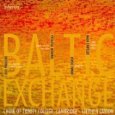 Baltic Exchange: Choral Music by Prauliņš, Einfelde, Sisask and Miškinis, Choir of Trinity College, Cambridge, Stephen Layton (Hyperion)
Baltic Exchange: Choral Music by Prauliņš, Einfelde, Sisask and Miškinis, Choir of Trinity College, Cambridge, Stephen Layton (Hyperion)A fascinating anthology of contemporary a capella vocal works from Estonia, Latvia and Lithuania, the music is mercifully free of the saccharine blandness that afflicts some modern choral composition, while remaining accessible and vividly communicative. The birth dates of the composers on this disc range from 1939 to 1957. All developed up under Soviet influence, isolated from the more avant-garde styles being explored in Western Europe, and this gives much of their music a distinct, unusual flavour - what the sleeve note describes as "a lucidity of texture, a pragmatic use of avant garde effects…diatonically saturated harmony and the frequent use of ostinatos". There are ear-tickling touches - the spoken chants during Uģis Prauliņš’s dance-filled Missa Regenis are striking and effective. Maija Einfelde’s Cikls ar Friča Bärdas dzeju is a contrastingly introverted setting of words by a Latvian poet. Urmas Sisak’s brief Benedictio captivates with its nagging ostinato figures and hypnotic repetition. Vytautas Miškinis’s tender three-minute Angelis suis Deus was composed as a gift for the conductor Stephen Layton. The disc closes with Miškinis’s mesmeric Pater Noster with its minimalist opening figure soon adorned with solo soprano. Beautifully recorded in Ely Cathedral, the sound has a luminous glow, but the texts always remain audible. Informative, interesting booklet notes too. Find on Amazon
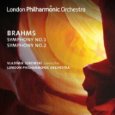 Brahms: Symphonies Nos 1 and 2, London Philharmonic Orchestra/Jurowski (LPO)
Brahms: Symphonies Nos 1 and 2, London Philharmonic Orchestra/Jurowski (LPO)So many studio recordings of Brahms symphonies sound stodgy and ponderous. This pair of budget-priced CDs on the LPO’s own label demonstrate how, in the right hands, the first two symphonies can thrill and delight. Vladimir Jurowski gets the mighty C Minor off to an incisive start - those pounding timpani notes signalling gravitas but never hindering forward motion. The middle movements contain exquisite wind playing and the lengthy finale coheres nicely - the big horn solo working its magic and the rest of the movement steadily building up to the cathartic final trombone chorale. The Second symphony is a subtler, more original work; Jurowski again observes the first movement repeat and is unafraid to take us into the darker regions, with a fantastic central climax - those layered brass discords are appropriately unsettling. The tone of the symphony slowly brightens, and the Finale is probably the most unbuttoned and sunny music that Brahms ever composed. It is genuinely exciting here, and never sounds flash or superficial. These are "real" live performances, with no patching sessions or retakes, and the Royal Festival Hall sound is warm, clear and well-focussed. Find on Amazon
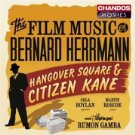 Bernard Herrmann: selections from Hangover Square and Citizen Kane, BBC Philharmonic/Gamba, with Orla Boylan (soprano) and Martin Roscoe (piano) (Chandos)
Bernard Herrmann: selections from Hangover Square and Citizen Kane, BBC Philharmonic/Gamba, with Orla Boylan (soprano) and Martin Roscoe (piano) (Chandos)Listening to film music divorced from the accompanying images can be an unsettling, unsatisfying experience. The soundtracks that I like best, I enjoy because I love the films that go with them - each musical gesture matched perfectly to a visual one. And yet Bernard Herrmann’s best film scores do "work" independently - you sense within a few bars that a keen musical intelligence is at work, and there is remarkably little padding. Herrmann’s work for Alfred Hitchock was masterly - the curious should hunt down Esa-Pekka Salonen’s superb Sony disc which includes generous selections from Vertigo and Psycho. He was subsequently sought out by directors including Truffaut and Scorsese, and died hours after completing recording sessions for the score of Taxi Driver in 1976. Herrmann always thought of himself as a composer who wrote for films, not as a film composer, but his concert works are rarely revived. In the late 1930s he was Orson Welles’s house musician, moving with him to Hollywood and subsequently scoring Citizen Kane. Rumon Gamba and the BBC Philharmonic give us a generous selection of Kane excerpts on this disc, arranged by Stephen Hogger. That brooding opening - all muted brass and low winds - is chilling, the Dies Irae motif immediately signalling that the film’s end will be a bleak and lonely one. (I played this sequence to a class of eight-year-olds who were soon terrified and begged me to turn it off.) The lighter moments sparkle and this recording includes the marvellous pastiche aria written for Kane’s second wife, here sung by Orla Boyan, sounding suitably uncomfortable while never descending into parody. The CD opens with extracts from Herrmann’s lesser-known 1944 score to John Brahm’s Hangover Square. Superbly atmospheric, it climaxes with a truly bleak Concerto Macabre for piano and orchestra, performed in the film by the insane protagonist. It’s delicious and compelling, played here with panache by the excellent Martin Roscoe. Find on Amazon
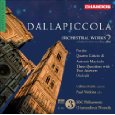 Dallapiccola: Orchestral Works, Volume 2, BBC Philharmonic/Noseda, with Paul Watkins (cello) and Gillian Keith (soprano) (Chandos)
Dallapiccola: Orchestral Works, Volume 2, BBC Philharmonic/Noseda, with Paul Watkins (cello) and Gillian Keith (soprano) (Chandos)Luigi Dallapiccola (1904-1975) was one of the 20th century’s most refined and sophisticated composers, possessing an innate, very Italian lyricism. He was also the first major Italian composer to adopt Schoenbergian serialism. Along with composers such as Frank Martin and Roberto Gerhard, Dallapiccola showed that adopting the 12-note method could create music of real beauty. The mature works on this disc are incredibly refined, the often extravagant orchestral forces used sparingly and with delicacy. The early Partita of 1930-32 is untypically bold and assertive - a compact four-movement work beginning in brooding fashion, moving through swaggering brassy aggression and finishing unexpectedly with a gentle soprano lullaby. The other pieces are more characteristic, the serial melodies angular but always singable. The enigmatic Dialoghi for cello and orchestra teams up the soloist with different groups of instruments while the Quattro Liriche di Antonio Machado is a setting of poems by the Spanish poet for soprano and orchestra. Quirkiest of all is Dallapiccola’s final orchestral work, Three Questions with Two Answers (1962-3) which alludes to Charles Ives. I can’t imagine a better case being made for this challenging, bracing music than by Gianandrea Noseda’s BBC Philharmonic, together with soprano Gillian Keith and cellist Paul Watkins. And how cheering that a major independent label should be issuing such offbeat repertoire. Excellent recording and sleeve notes. Find on Amazon.
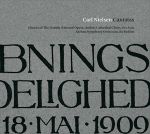 Nielsen: Cantatas, Chorus of the Danish National Opera, Aarhus Cathedral Choir, Vox Aros, Aarhus Symphony Orchestra/Holten (Dacapo)
Nielsen: Cantatas, Chorus of the Danish National Opera, Aarhus Cathedral Choir, Vox Aros, Aarhus Symphony Orchestra/Holten (Dacapo)The symphonies of the Danish composer Carl Nielsen (1865-1931) are now virtually standard repertoire. His was a humane and extrovert musical voice, no less individual than that of Sibelius. Anyone feeling down in the mouth should listen to a recording of the Sinfonia Espansiva - few symphonies convey such a feeling of invigorating optimism. The Danish label Dacapo here give us a selection of rare choral works. The Cantata for the opening ceremony of the 1909 national exhibition in Aarhus was a collaboration between Nielsen and his younger pupil Emilius Bangert. It’s suitably dutiful and a little bland, with the need to set such a leaden, four-square text making it hard for either composer to show much sparkle. The 1908 Cantata for the annual university commemoration is far more typical of this composer, despite another turgid libretto. The more intimate moments are affecting - sample the tenor and soprano duet in Part One, with a piano nicely integrated into the orchestral texture. We also get the 1923 music for the dramatist Hans Pedersen’s Homage to Holberg: breezy and witty, you sense immediately that Nielsen was here far more engaged with the job in hand. There is also a brief but very lyrical tenor aria from a 1916 Shakespeare tribute. Performances are outstanding, with a particularly impressive contribution from the Aarhus Cathedral Choir. Mandatory listening for Nielsen aficionados. Find on Amazon
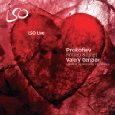 Prokofiev: Romeo & Juliet, London Symphony Orchestra/Gergiev (LSO Live)
Prokofiev: Romeo & Juliet, London Symphony Orchestra/Gergiev (LSO Live)I enjoyed Valery Gergiev’s live cycle of Prokofiev Symphonies, issued several years ago on the Philips label. This new Romeo and Juliet was also taped during concerts at the Barbican and is this time released at budget price on the LSO’s own label. Prokofiev skilfully filleted this huge ballet score to make three shorter orchestral suites, but there’s so much more pleasure to be had in hearing the 140-minute work complete. Familiar melodies appear in their proper context, alongside a wealth of material that usually only gets heard in the theatre. The orchestra is enormous - the booklet needs two pages to list the LSO players. With such luxury casting, the results are predictably thrilling. Gergiev directs with a theatrical swagger and the more aggressive, brassy numbers have a shattering, visceral impact. The weight of the LSO string sound lends unbearable poignancy to the closing pages, and Gergiev finds space for humour too - listen out for the mandolins. Let’s hope that the same team tackle Prokofiev’s Cinderella. Find on Amazon
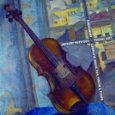 Stravinsky: Complete Music for Violin and Piano, Anthony Marwood (violin) and Thomas Adès (piano) (Hyperion)
Stravinsky: Complete Music for Violin and Piano, Anthony Marwood (violin) and Thomas Adès (piano) (Hyperion)This beguiling two-disc set collects all of Igor Stravinsky’s output for violin and piano. The transcriptions of music familiar from the ballet scores mostly date from his 1930s collaboration with violinist Samuel Dushkin, for whom the Violin Concerto had been composed. Short of repertoire, and seeing the financial gains to be made from going out on tour, Stravinsky skilfully reworked pieces better known in their orchestral garb. There are extracts from The Firebird, Petrushka, The Fairy’s Kiss, The Nightingale and Mavra. There is also an extended suite based on movements from Pulcinella. All are delightful, the reduced scoring letting one hear at close range the quirkiness and originality of this endlessly fascinating composer. The Duo Concertant is a little cooler and more austere, but Anthony Marwood and Thomas Adès make it sing. If you’re unconvinced by my recommendation, sample the Chanson Russe or the Tango and I defy you not to grin. Performances are superb - Marwood and Adès accentuating the innate charm of this music whilst making light of any technical difficulties. Find on Amazon
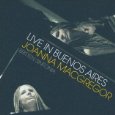 Bach: Concerto for Keyboard and Strings in D minor; Stravinsky: Concerto in D for String Orchestra, plus shorter works by Dowland, Gismonti, Golijov and Piazzola, Britten Sinfonia/Joanna MacGregor piano/director (Sound Circus)
Bach: Concerto for Keyboard and Strings in D minor; Stravinsky: Concerto in D for String Orchestra, plus shorter works by Dowland, Gismonti, Golijov and Piazzola, Britten Sinfonia/Joanna MacGregor piano/director (Sound Circus)A superbly engineered recording of a concert given in the Teatro Coliseo in 2007, this is a superbly entertaining cd. The larger works are Bach’s BWV1052 D minor piano concerto and Stravinksy’s febrile Concerto in D for string orchestra- both intense and exciting. The real treasures follow - three magical transcriptions of songs by John Dowland which bring this potentially austere repertoire to vivid life. Best of all are the final items - shorter pieces by Egberto Gismonti, Osvaldo Golijov and Astor Piazolla. All sound so vivid, so vibrant - MacGregor’s communicative gifts wonderfully displayed. Few tapings of live concerts work as well as this for those who weren’t in attendance, and the strings of the Britten Sinfonia are alert and responsive accompanists. Find on Amazon
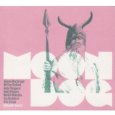 Moondog: Sidewalk Dances - 14 Moondog Pieces arranged by Joanna MacGregor. Britten Sinfonia/Joanna MacGregor piano/director (Sound Circus)
Moondog: Sidewalk Dances - 14 Moondog Pieces arranged by Joanna MacGregor. Britten Sinfonia/Joanna MacGregor piano/director (Sound Circus)Joanna MacGregor’s earlier releases on the Sound Circus label are now being reissued by Warner Classics. Sidewalk Dances is an album of 14 short compositions by Moondog, arranged by Joanna MacGregor and played by her with the Britten Sinfonia. Born Louis Thomas Hardin in Kansas in 1916, Moondog made his name as a street performer in New York. In the early 1970s he moved to Germany until his death in 1999. Accidentally blinded and always wearing his homemade Viking costume, he was much more than an itinerant eccentric. Moondog was classically trained, and knew Stravinsky, Dizzy Gillespie and Charlie Parker. This selection of miniatures is revelatory - the pieces are short, punchy and catchy, full of parping saxes and jazzy rhythms. MacGregor’s arrangements give Moondog’s originally sparse textures brighter, richer colours without sacrificing their energy and bite. The Britten Sinfonia sound completely at home, aided by superb percussion playing. Unmissable, joyous fun. Find on Amazon
Share this article
more Classical music
 Guildhall School Gold Medal 2024, Barbican review - quirky-wonderful programme ending in an award
Ginastera spolights the harp, Nino Rota the double bass in dazzling performances
Guildhall School Gold Medal 2024, Barbican review - quirky-wonderful programme ending in an award
Ginastera spolights the harp, Nino Rota the double bass in dazzling performances
 Queyras, Philharmonia, Suzuki, RFH review - Romantic journeys
Japan's Bach maestro flourishes in fresh fields
Queyras, Philharmonia, Suzuki, RFH review - Romantic journeys
Japan's Bach maestro flourishes in fresh fields
 Classical CDs: Swans, hamlets and bossa nova
A promising young pianist's debut disc, plus Finnish mythology and a trio of neglected British composers
Classical CDs: Swans, hamlets and bossa nova
A promising young pianist's debut disc, plus Finnish mythology and a trio of neglected British composers
 Christian Pierre La Marca, Yaman Okur, St Martin-in-The-Fields review - engagingly subversive pairing falls short
A collaboration between a cellist and a breakdancer doesn't achieve lift off
Christian Pierre La Marca, Yaman Okur, St Martin-in-The-Fields review - engagingly subversive pairing falls short
A collaboration between a cellist and a breakdancer doesn't achieve lift off
 Ridout, Włoszczowska, Crawford, Lai, Posner, Wigmore Hall review - electrifying teamwork
High-voltage Mozart and Schoenberg, blended Brahms, in a fascinating programme
Ridout, Włoszczowska, Crawford, Lai, Posner, Wigmore Hall review - electrifying teamwork
High-voltage Mozart and Schoenberg, blended Brahms, in a fascinating programme
 Sabine Devieilhe, Mathieu Pordoy, Wigmore Hall review - enchantment in Mozart and Strauss
Leading French soprano shines beyond diva excess
Sabine Devieilhe, Mathieu Pordoy, Wigmore Hall review - enchantment in Mozart and Strauss
Leading French soprano shines beyond diva excess
 Špaček, BBC Philharmonic, Bihlmaier, Bridgewater Hall, Manchester review - three flavours of Vienna
Close attention, careful balancing, flowing phrasing and clear contrast
Špaček, BBC Philharmonic, Bihlmaier, Bridgewater Hall, Manchester review - three flavours of Vienna
Close attention, careful balancing, flowing phrasing and clear contrast
 Watts, BBC Symphony Orchestra and Chorus, Bignamini, Barbican review - blazing French masterpieces
Poulenc’s Gloria and Berlioz’s 'Symphonie fantastique' on fire
Watts, BBC Symphony Orchestra and Chorus, Bignamini, Barbican review - blazing French masterpieces
Poulenc’s Gloria and Berlioz’s 'Symphonie fantastique' on fire
 Bell, Perahia, ASMF Chamber Ensemble, Wigmore Hall review - joy in teamwork
A great pianist re-emerges in Schumann, but Beamish and Mendelssohn take the palm
Bell, Perahia, ASMF Chamber Ensemble, Wigmore Hall review - joy in teamwork
A great pianist re-emerges in Schumann, but Beamish and Mendelssohn take the palm
 First Persons: composers Colin Alexander and Héloïse Werner on fantasy in guided improvisation
On five new works allowing an element of freedom in the performance
First Persons: composers Colin Alexander and Héloïse Werner on fantasy in guided improvisation
On five new works allowing an element of freedom in the performance
 First Person: Leeds Lieder Festival director and pianist Joseph Middleton on a beloved organisation back from the brink
Arts Council funding restored after the blow of 2023, new paths are being forged
First Person: Leeds Lieder Festival director and pianist Joseph Middleton on a beloved organisation back from the brink
Arts Council funding restored after the blow of 2023, new paths are being forged
 Classical CDs: Nymphs, magots and buckgoats
Epic symphonies, popular music from 17th century London and an engrossing tribute to a great Spanish pianist
Classical CDs: Nymphs, magots and buckgoats
Epic symphonies, popular music from 17th century London and an engrossing tribute to a great Spanish pianist

Add comment